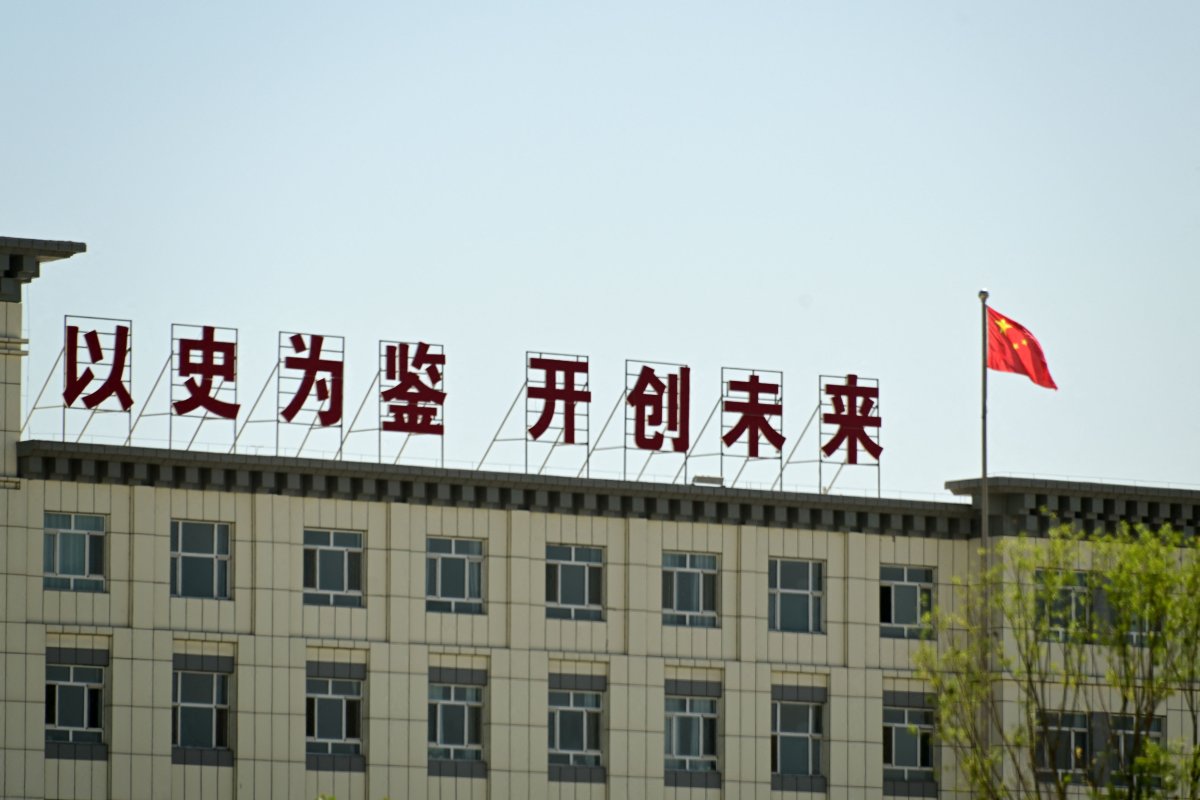A Chinese diplomatic mission has posted a politically loaded visual comparing the Gaza conflict with the current situation in China's northwestern province of Xinjiang.
China's embassy in France posted on X, formerly Twitter, a photo comparing the buildings in Xinjiang, which are standing intact, with buildings in Gaza that have been destroyed in the recent bombing. Xinjiang is where "the Chinese government has reportedly arbitrarily detained more than a million Muslims in reeducation camps since 2017," most of them Uyghur, a predominantly Turkic-speaking ethnic group. Uyghurs in the region have been subjected to "intense surveillance, forced labor, involuntary sterilizations, among other rights abuses," Lindsay Maizland of the Council on Foreign Relations wrote.
"The United States and several other foreign governments have described China's actions in Xinjiang as genocide, while the U.N. human rights office said that the violations could constitute crimes against humanity," Maizland said.
The current conflict in Gaza began with an unprecedentedly large attack on southern Israel by the Palestinian militant group Hamas on October 7. As of Monday, over 1,400 people had been killed in Israel, the Associated Press reported, citing the Israeli military. Over 8,000 people have been killed in Gaza, according to authorities there.
Sans titre. pic.twitter.com/JolIpmyZbA
— Ambassade de Chine en France (@AmbassadeChine) October 30, 2023
The Chinese embassy's post, which said "unlabeled" in French, appears to imply that the U.S.' policies have led to the destruction of Gaza, while China's policies in Xinjiang have brought about prosperity for the region.
Meanwhile, Zhang Heqiang, China's director of cultural affairs in Pakistan, an Islamic republic, deleted the same post comparing Xinjiang with Gaza after previously posting it, Newsweek has confirmed.
Newsweek contacted the Chinese embassy in Washington, D.C., for comment via email. Newsweek also contacted the Israel Economic and Cultural Office in Taipei, via phone and email.
Uyghur activists told Newsweek the two contexts can't be compared.
"There's no way you can compare this. There's no tiny street in East Turkistan (Xinjiang's name before the 1949 Chinese invasion) where you can even speak or throw a rock," said Rahima Mahmut, the U.K. director for the World Uyghur Congress, told Newsweek.
"China has destroyed the very essence of Uyghurs' lives and identity, not just their homes," Salih Hudayar, prime minister of the East Turkestan Government in Exile, told Newsweek. If Uyghurs had been given the same level of foreign aid and support as Palestinians, "we would have been able to establish and develop a prosperous, independent East Turkistan."
China's position on the Israeli-Palestinian conflict has been scrutinized as Beijing has sought to act as a peacemaker. China has not officially condemned Hamas's attack on Israel while calling for a ceasefire in the conflict.
"The top priority is to bring about a cease-fire and end the war as soon as possible to avoid the conflict from expanding or even getting out of control and causing a serious humanitarian crisis," said Chinese leader Xi Jinping during a meeting with Egyptian Prime Minister Mostafa Madbouly.
However, the current conflict has provided Beijing with a strategic opportunity to seek the support of Arab states while attempting to sideline the issue of Uyghur mass detentions in Xinjiang.
"With one stroke, China has gained the support of the Arab world while washing away its Xinjiang sins," an official diplomatic source told Newsweek.
China's Xinjiang policies, despite its incarceration of over 1 million ethnic Uyghur Muslims, have received minimal criticism from the Arab world. Beijing hopes to use the current conflict and backing of Arab leaders to shore up its geopolitical agenda of winning the countries in the Global South while ensuring the Xinjiang issue takes a backseat in the Arab world for the foreseeable future.
"And while we're seeking justice, the Chinese government is portraying itself as a better leader," Mahmut told Newsweek.
"Those who willingly accept this propaganda are only green-lighting Beijing's aggressive colonialism and genocide," Hudayar said.
Arab countries are now actively seeking China's involvement in bringing about a ceasefire in the current hostilities.
"Qatar attaches great importance to China's role and influence and stands ready to strengthen communication with China to make efforts to settle the Palestinian question in a just and reasonable manner at an early date," Qatar's foreign minister Mohammed bin Abdulaziz Al-Khulaifi told Zhai Jun, China's special envoy to the Middle East, recently during a meeting.

Meanwhile, Hamas appears confident that China will take lessons from their attack on Israel rather than criticizing.
Khaled Mashal, a Hamas leader, recently told Egyptian TV network Sada El Balad in an interview that China was impressed by the October 7 attack: "China saw our attack as a dazzling example."
Mashal added that China has learned a lesson from the Hamas attack while planning its strategy for Taiwan.
"The Chinese are thinking of carrying out a plan in Taiwan, doing what the Al-Qassam Brigades did on October 7," he said in the interview.
While gaining support from the Arab world, Beijing is hoping to squarely put the blame for the Israeli-Palestinian conflict on the U.S.
The Chinese embassy in Paris posted a cartoon showing Uncle Sam holding up a sign with the message "I Veto" while a group gathered at the United Nations looks at fire raging in Gaza.
In recent days, China has tried to maintain a balancing act while also emphasizing Israel's "right to self-defense."
"Every country has the right to self-defense but should abide by international humanitarian law and protect civilians," Chinese foreign minister Wang Yi told Israeli counterpart Eli Cohen in a telephone call Monday.
Beijing on Tuesday repeated the same balancing act in the latest foreign ministry statement.
"All countries have the right to self-defense, but they should abide by international law, especially international humanitarian law, and protect the safety of civilians. Every life is precious, and the lives of the Palestinian people, like those of other countries, should be protected," Chinese foreign ministry spokesperson Wang Wenbin said.
Updated 10/31/23 3:20 p.m.: This article was been updated with comments from Salih Hudayar.
Uncommon Knowledge
Newsweek is committed to challenging conventional wisdom and finding connections in the search for common ground.
Newsweek is committed to challenging conventional wisdom and finding connections in the search for common ground.
About the writer
Aadil Brar is a reporter for Newsweek based in Taipei, Taiwan. He covers international security, U.S.-China relations, and East Asian ... Read more





